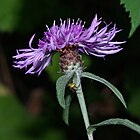From today's featured article
The tomb of Tutankhamun was uncovered beginning on 4 November 1922 by excavators in the Valley of the Kings led by Howard Carter, an Egyptologist. Whereas the tombs of most pharaohs of ancient Egypt were plundered in ancient times, Tutankhamun's tomb was hidden by debris for most of its existence and not extensively robbed. Conserving the burial goods required a ten-year effort, and their opulence inspired a media frenzy, intensified by speculation that misfortunes connected with the tomb were the result of an ancient curse. Friction between the Egyptian government and the British-led excavation team resulted in a settlement by which the burial goods remained in Egypt, instead of being divided between the excavators and the government as had been standard Egyptological practice. The discovery yielded limited information about events in Tutankhamun's time but a great deal about the material culture of the era. The fame of the discovery made Tutankhamun a symbol of ancient Egypt itself. (Full article...)
Did you know ...
- ... that meadow knapweed (example pictured) is a hybrid between black knapweed and brown knapweed, which were both introduced to North America?
- ... that Pride Month is held in commemoration of the Stonewall riots?
- ... that Manuel Carpio's 1849 poem is the earliest literary depiction of the weeping ghost La Llorona?
- ... that Denver's oldest building continuously used for Protestant worship, the Evans Memorial Chapel, is now also used by Catholics?
- ... that Graham Hawkins coached the Wolverhampton Wanderers to the top division in his first season as a manager?
- ... that the studios of a California TV station were converted back into a movie theater after it went out of business?
- ... that Hirsch Sommerhausen worked as a court translator in a dozen languages?
In the news

- Tropical Storm Nalgae leaves more than 150 people dead in the Philippines (rescue operation pictured).
- In the Brazilian general election, two-term former president Luiz Inácio Lula da Silva defeats incumbent Jair Bolsonaro.
- In India, a footbridge collapse in Morbi, Gujarat, results in the deaths of at least 135 people.
- In baseball, the Orix Buffaloes defeat the Tokyo Yakult Swallows to win the Japan Series.
On this day
November 4: National Unity and Armed Forces Day in Italy (1918)
- 1912 – The keel of USS Nevada was laid down, beginning construction on the United States Navy's first "super-dreadnought".
- 1938 – The Hlinka Guard and Slovakian police began the deportation of several thousand Jews from the country.
- 1970 – Authorities in California discovered a 13-year-old feral child, pseudonymously known as Genie, who had spent nearly her entire life in social isolation.
- 2008 – Barack Obama (pictured) became the first African American to be elected President of the United States.
- Hu Zongxian (b. 1512)
- Felix Mendelssohn (d. 1847)
- Joseph Rotblat (b. 1908)
From today's featured list
The Manga Taishō ("Cartoon Grand Prize") is a Japanese comics award recognizing achievement in manga. It is awarded annually to a manga series published in the previous calendar year of eight or fewer collected volumes in length. The prize is presented by a volunteer committee of roughly one hundred "manga lovers from all walks of life", primarily bookstore workers who manage in-store manga sections. Individuals directly involved in the manga industry are barred from sitting on the committee; this distinguishes the Manga Taishō from the majority of the other major manga industry awards, which are typically organized by a specific publishing company and voted on by the company's editors. The Manga Taishō has been awarded fifteen times since its inception in 2008, most recently in 2022 to Darwin Jihen by Shun Umezawa. Akiko Higashimura is the most-nominated author, with seven lifetime nominations including her win for Blank Canvas: My So-Called Artist's Journey in 2015. (Full list...)
Today's featured picture

|
Gismonda is a 1919 French-language grand opera by Henry Février to a libretto by Henri Caïn and Louis Payen based on the 1894 play Gismonda by Victorien Sardou. The planned premiere in Paris was halted by the outbreak of World War I, but the composer was given leave from the French army to premiere the opera with Mary Garden in the title role at the Chicago Opera on 14 January 1919. Gismonda opened in Paris at the Opéra-Comique on 15 October, for which occasion this poster was designed by Georges Rochegrosse. Poster credit: Georges Rochegrosse; restored by Adam Cuerden
Recently featured:
|
Other areas of Wikipedia
- Community portal – The central hub for editors, with resources, links, tasks, and announcements.
- Village pump – Forum for discussions about Wikipedia itself, including policies and technical issues.
- Site news – Sources of news about Wikipedia and the broader Wikimedia movement.
- Teahouse – Ask basic questions about using or editing Wikipedia.
- Help desk – Ask questions about using or editing Wikipedia.
- Reference desk – Ask research questions about encyclopedic topics.
- Content portals – A unique way to navigate the encyclopedia.
Wikipedia's sister projects
Wikipedia is written by volunteer editors and hosted by the Wikimedia Foundation, a non-profit organization that also hosts a range of other volunteer projects:
-
Commons
Free media repository -
MediaWiki
Wiki software development -
Meta-Wiki
Wikimedia project coordination -
Wikibooks
Free textbooks and manuals -
Wikidata
Free knowledge base -
Wikinews
Free-content news -
Wikiquote
Collection of quotations -
Wikisource
Free-content library -
Wikispecies
Directory of species -
Wikiversity
Free learning tools -
Wikivoyage
Free travel guide -
Wiktionary
Dictionary and thesaurus
Wikipedia languages
This Wikipedia is written in English. Many other Wikipedias are available; some of the largest are listed below.
-
1,000,000+ articles
-
250,000+ articles
-
50,000+ articles



